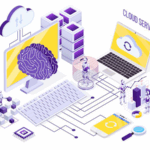Supercharge Your eCommerce: Innovative Mobile App Development Solutions
October 31, 2025 | 0 Comments
info@trickywebsolutions.com |
+1-225-276-2741
 USA
USA IN
IN
 SG
SG
 PT
PT
In recent years, the financial and technological landscapes have been rapidly evolving, thanks in large part to the rise of cryptocurrency and blockchain. These groundbreaking innovations are transforming how we transact, communicate, and build digital trust. As the world continues to embrace these technologies, their influence spans beyond finance into sectors like healthcare, logistics, education, and real estate. In this blog, we explore how cryptocurrency and blockchain are reshaping the world and why understanding them is crucial in 2025 and beyond.
Cryptocurrency and blockchain emerged as a response to the flaws in traditional financial systems. While blockchain serves as the foundational technology that ensures transparency, immutability, and security, cryptocurrencies provide an alternative, decentralized financial ecosystem. This dual force has opened new avenues for innovation and democratized access to financial resources.
Blockchain operates as a decentralized ledger, storing data across a network of computers, ensuring protection against tampering. Decentralized cryptocurrency systems remove the need for a central authority like a bank, allowing peer-to-peer transactions that are secure and instantaneous.
Cryptocurrency is virtual or digital currency that relies on cryptography for protection. In contrast to government-issued currencies, cryptocurrencies are normally decentralized and work on a peer-to-peer network. This implies that transactions happen between users directly without the presence of intermediaries such as banks. Popular examples include Bitcoin, Ethereum, and Litecoin. These digital assets can be used for a variety of purposes, from buying goods and services to investing and transferring money across borders.
Most cryptocurrencies are built on the foundational framework of blockchain. It is a decentralized digital ledger that records transactions across multiple computers, ensuring that the recorded data cannot be changed once confirmed. Each block holds a collection of transactions and, once finalized, is linked to the previous blocks in a sequential, time-stamped order. The decentralized nature of blockchain makes it incredibly secure and transparent, making it applicable beyond cryptocurrency in areas like supply chain, healthcare, and real estate.
Cryptography forms the backbone of blockchain technology. It ensures that transactions are secure, user identities remain private, and data within the network remains consistent and tamper-proof. In blockchain systems, cryptographic methods such as hashing and digital signatures protect the integrity of data, enabling a decentralized yet trustworthy framework.
By encrypting transaction information and verifying identities, cryptography helps maintain the security of public networks. This makes blockchain an ideal solution for applications where data integrity and privacy are critical. Without cryptography, the transparency and immutability that blockchain offers would not be possible.
Conventional banking systems are often sluggish, costly, and lack the transparency needed for trust. Blockchain technology accelerates settlements, lowers fees, and eliminates intermediaries. Decentralized cryptocurrency platforms like Ethereum and Solana enable smart contracts, which automate transactions based on pre-set conditions, minimizing human error and fraud.
Moreover, individuals can now store and manage their digital assets using the best crypto wallets, which provide high levels of security and usability. These wallets are vital tools for anyone engaged in the crypto space, offering features such as private key storage, transaction history, and integration with various tokens.
Ensuring transparency in supply chains has long been a complex issue. With blockchain development services, companies can now build platforms that track goods from their origin to the final destination. This traceability improves accountability and helps identify inefficiencies or fraud along the supply route.
Blockchain ensures secure storage of sensitive medical records, enabling better data sharing between institutions while preserving patient confidentiality. Token-based systems powered by decentralized cryptocurrency can also reward patients for participating in clinical trials or maintaining healthy lifestyles.
Academic credentials are increasingly being verified on blockchain platforms, reducing fraud and making cross-border employment and education easier. Institutions are working with blockchain development services providers to develop tamper-proof digital diplomas and certificates.
The real estate industry is leveraging blockchain to streamline transactions and secure ownership records. By eliminating intermediaries and reducing paperwork, cryptocurrency and blockchain make buying and selling property more efficient. Smart contracts ensure transparent and fair dealings between all parties involved.
Decentralized cryptocurrency solutions are particularly transformative for emerging economies where banking infrastructure is weak or absent. Cryptocurrencies like Bitcoin and stable coins are becoming alternatives to local fiat currencies, protecting individuals from hyperinflation.
For anyone involved in this space, selecting from the best crypto wallets is a fundamental step. There are two main types: hot wallets (internet-connected) and cold wallets (offline). Each has its pros and cons depending on the level of security and accessibility you need. Features to look for include:
Leading wallets like MetaMask, Ledger Nano X, and Trust Wallet are popular choices among users for both convenience and security.
A successful blockchain platform is built on the expertise of a dependable development team. Blockchain development services are essential for creating customized blockchain solutions tailored to specific industry needs. These services include:
Choosing a reputable blockchain development partner can make or break your digital transformation initiative.
As the world continues to digitize, cryptocurrency and blockchain are becoming integral to shaping a more transparent, decentralized, and efficient global economy. From secure financial transactions to transparent supply chains and immutable healthcare records, the applications are endless. Whether you’re an investor, entrepreneur, or simply curious, embracing cryptocurrency and blockchain technology is no longer optional—it’s essential.
With the increasing availability of decentralized cryptocurrency systems, the evolution of blockchain development services, and the wide range of best crypto wallets to support users, these technologies are democratizing finance and beyond. The future is not just digital—it’s decentralized.
Recent Posts

Supercharge Your eCommerce: Innovative Mobile App Development Solutions
October 31, 2025 | 0 Comments

Building the Future: Scalable & Agile Cloud Native App Development Solutions
October 30, 2025 | 0 Comments

Powering the Future: Unleashing Limitless Possibilities with Our AI App Development Expertise
October 30, 2025 | 0 Comments

Dominate 2025 with Next-Gen AI and ML Services for Future-Ready Growth
August 7, 2025 | 0 Comments

Scale Smarter in 2025: Why AI-Powered Cloud-Native Application Development is the Future
August 7, 2025 | 0 Comments

Your 2025 Guide to Next-Gen AI Development for Smarter Business Solutions
August 4, 2025 | 0 Comments
Categories

We will zealously try to help you by providing technical support. We are open to inquiries or requests.
info@trickywebsolutions.com
1945 Brightside Drive, Baton Rouge, LA -70820
We are available for a friendly chat to discuss your business needs, no obligation.